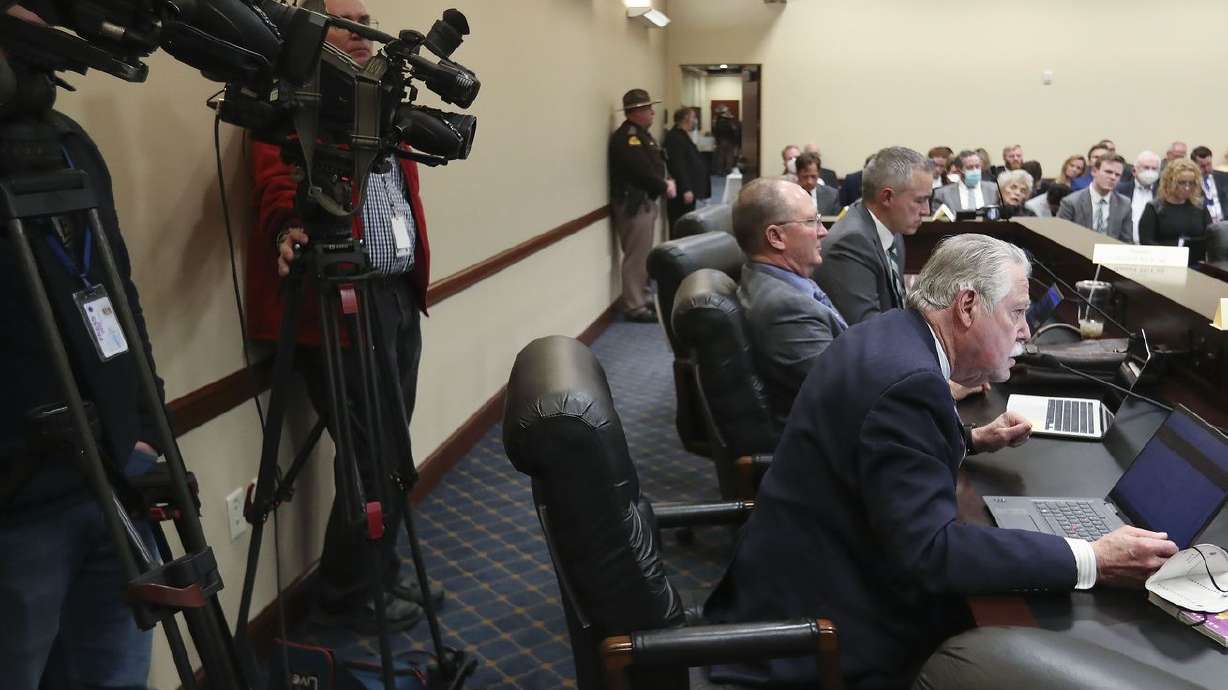Estimated read time: 4-5 minutes
This archived news story is available only for your personal, non-commercial use. Information in the story may be outdated or superseded by additional information. Reading or replaying the story in its archived form does not constitute a republication of the story.
SALT LAKE CITY — In a preliminary vote, the Utah Senate expressed willingness to limit media access to certain areas of the Capitol unless journalists obtain permission or are accompanied by lawmakers.
SR1, sponsored by Sen. Mike McKell, R-Spanish Fork, was heard in a lively committee debate last week and was recommended favorably, despite protestations from media representatives who argued the rule would limit accountability and transparency.
The rule would require that journalists obtain permission from a Senate media designee in order to have access to the Senate floor and adjacent hallways. It would also require that videographers or photographers get permission from a committee chairperson before standing behind the dais to photograph testimony during a hearing.
McKell cited security concerns as the impetus for the rule, including threats against Utah's Capitol in the wake of the Jan. 6 insurrection.
"We had threats against our Capitol this last year," he said. "When we came into session, one of the first threats on a U.S. (state) Capitol reported in The Washington Post was our Capitol. So I think it's important that we recognize that security is important."
Sen. Scott Sandall, R-Tremonton, agreed, saying the rule is "about conducting the peoples' business in a safe and a fair way." He said the Legislature provides "better access to the information than we've ever had," thanks in part to livestreams and recordings made available through its website.
Security concerns and threats are legitimate, said Sen. Lincoln Fillmore, R-South Jordan, but he ultimately voted against the resolution in part because he doesn't think the Legislature should be in the business of deciding which outlets or journalists are legitimate sources.
"I'm struggling with what the standards should be, and I'm hesitant to have the Legislature decide ... which avenues are worthy of a (press) credential and which ones aren't," he said.
Other senators seemed to support the rule change for more personal reasons — namely how the media covers them.
"I wish that there were a way for us to be able to say that when we are working with the media, that we're always given a fair shake. I don't know that that's always the case," said Sen. Jake Anderegg, R-Lehi, adding that while some journalists are fair, others are not. "I can only speak anecdotally from my own experience, but I have witnessed with my own eyes, members of the media skulking into the chamber in here, hiding behind pillars and eavesdropping on conversations ... as opposed to coming to my face and asking me a question."
Anderegg called the bill a "reasonable curtailing" of access for the media, saying they shouldn't get "unfettered access" to the Capitol and lawmakers.
"I can't tell you how many times I've given 45-minute interviews to be quoted one line and it's spun in any way that they want it," he said. "I don't know that I have a ton of faith that the media isn't more interested in selling their wares than they are about actually conveying truth."
"Lots of debate on this resolution by senators," the Alliance for a Better Utah said in a tweet after the vote. "While security concerns are being used to explain why senators need these changes to press access, it's clear there are some who just don't like the coverage they receive in the press."
Lots of debate on this resolution by senators. While security concerns are being used to explain why senators need these changes to press access, it's clear there are some who just don't like the coverage they receive in the press. #utpol#utleghttps://t.co/5wvP2hgjxR
— Better Utah (@betterutah) February 14, 2022
Sen. Curt Bramble, R-Provo, insinuated that media members wanted complete access to the Capitol and lawmakers, including in private offices and restrooms.
"We were told in the committee ... because we are public officials, the public has a right to know. Neither we nor any constituent has any right to privacy in nonpublic areas of the Capitol," he said. "Now I stand in support of this bill and I reject that as being an untenable, unconscionable approach."
While some say the rule would have a somewhat minor impact on reporters, opponents of the resolution were concerned with the optics of the Legislature codifying such a rule.
"We have the right to set this as a rule. ... The one thing is, the optics of this whole thing is really poor, because it looks like we're trying to shut the media out. We're trying to shut the public out," said Sen. Gene Davis, D-Salt Lake City.
If individual chairpersons or senators can grant access based on subjective, unwritten rules or preferences, it could open the door for lawmakers to limit access to reporters they don't like, argued Sen. Kathleen Riebe, D-Cottonwood Heights.
"I just want to make sure that we're actually having an objective process throughout the whole entire discussion," she said. "And is there some kind of criteria we can create so that this is always an objective process?"
As a Senate resolution, SR1 does not need approval from the House or the governor. The Senate will likely take a final vote later this week.








